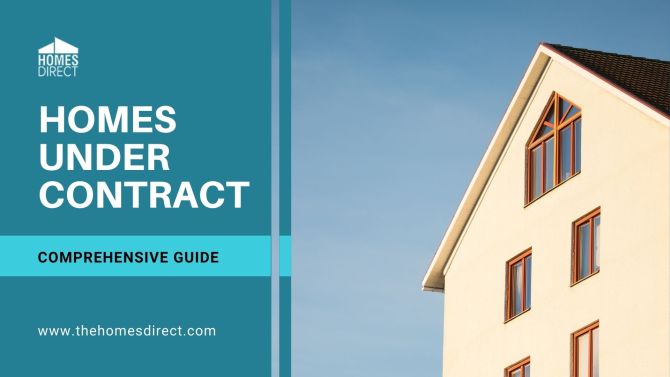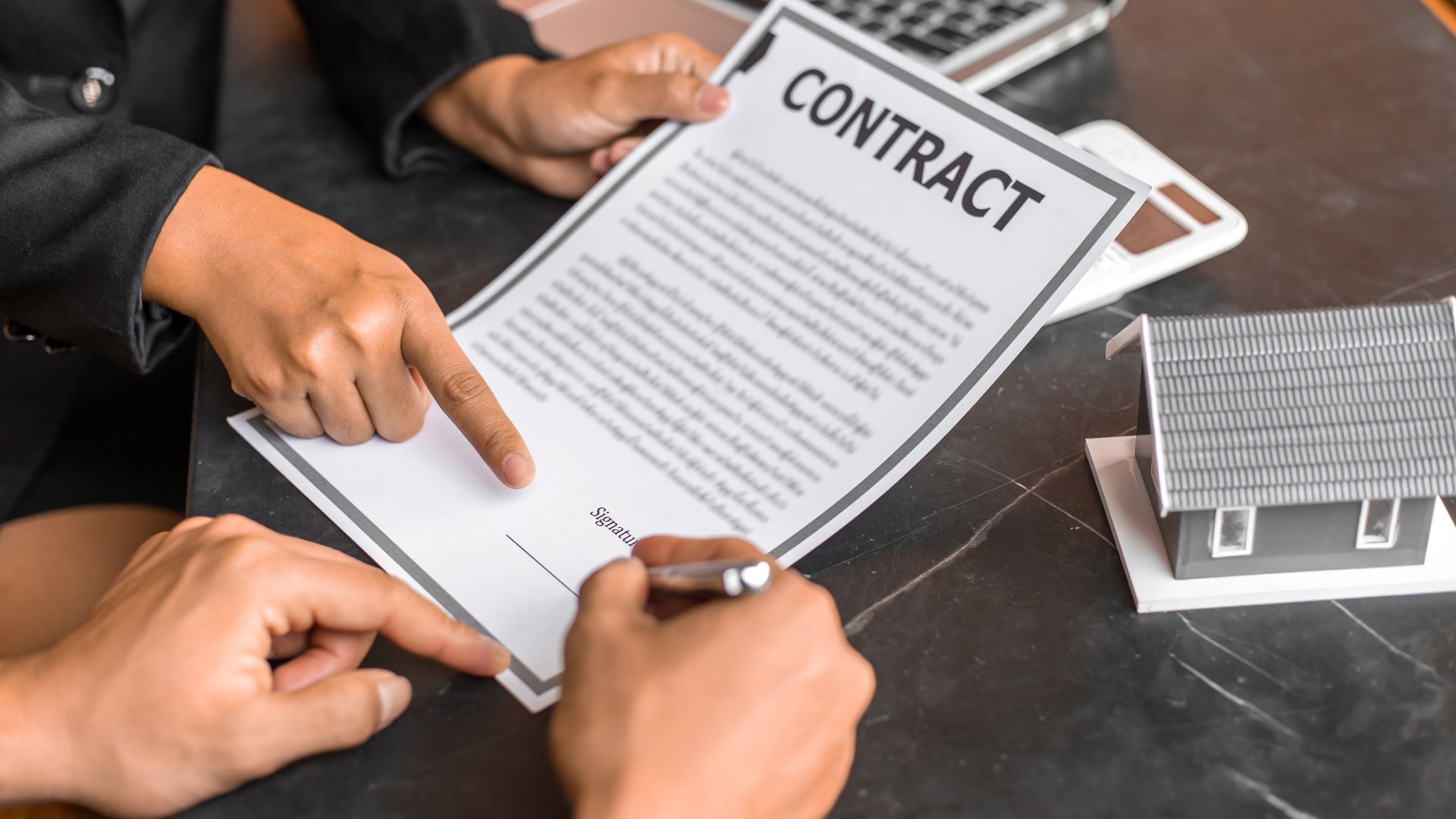
Table of Contents
- What does under contract mean in real estate?
- Under contract vs. pending: The main difference
- Things to consider when buying a home under contract
- The cost of homes under contract
- Pros and cons of homes under contract
- What to do if a house you love is under contract?
- Frequently asked questions about under-contract homes
- What happens if the original sale falls through?
In this article, we will explore the definition, structure, cost, pros, and cons of under-contract homes and answer frequently asked questions about them.
In this piece, we will delve into the meaning, composition, expenses, advantages, and disadvantages of homes under contract, as well as provide answers to common queries about them.
What does under contract mean in real estate?
When a buyer and seller have come to an agreement on the specifics of a sale and have both signed a binding agreement, the property is referred to as being "under contract."
The agreement, typically accompanied by a deposit from the buyer, serves as a legal commitment between both parties. As a result, the property is no longer available for purchase by any other potential buyers.
Properties that have received an offer from a buyer but have not yet been sold are also referred to as "pending sales," or "sale pending" besides the "under contract homes."
These properties are still in the process of closing the sale and are considered to be in a state of change. Both the buyer and seller must navigate various contingencies, which must be fulfilled prior to the sale being considered final.
Here are some of the most common forms of contingencies found in real estate:
|
Financing Contingency |
This means that the sale is contingent upon the buyer obtaining financing for the property. |
|
Home Inspection Contingency |
This allows the buyer to back out of the sale if the home inspection reveals significant problems that the seller is unable or unwilling to fix. |
|
Appraisal Contingency |
This contingency requires the property to appraise for a specific amount, or the sale will not be able to move forward. |
|
Sale of Buyer's Property Contingency |
This is a contingency that requires the sale of the buyer's current property before they can purchase the new property. |
|
Title Contingency |
This ensures that the title of the property is clear and free of any liens or encumbrances. |
|
Employment Contingency |
This is a contingency that requires the buyer to secure employment before the sale can be finalized. |
|
Insurance Contingency |
This requires the buyer to obtain homeowner's insurance before closing on the property. |
Under contract vs. pending: The main difference
In the real estate market, the terms "pending" and "under contract" are used to describe the status of a property that is for sale. These terms are often used interchangeably, but they actually refer to different stages of the sales process.
Understanding the difference between these two terms can be helpful for both buyers and sellers.
A property that is considered "pending" is in the early stages of the sales process. This means that the seller has received an offer from a buyer and has agreed to the terms and conditions of the sale, but the sale is not yet final.
The property is still subject to various contingencies, such as inspections or financing, that must be resolved before the sale can be completed. During this time, the property is still technically available for purchase by other buyers.
On the other hand, a property that is "under contract" has progressed further in the sales process. This means that a legally binding agreement has been signed by both the buyer and seller, and the sale is considered to be underway.
The buyer has typically made a deposit, which acts as a show of good faith and confirms their commitment to the sale. At this stage, the property is no longer available for purchase by other buyers. The remaining contingencies, if any, must be resolved before the sale can be considered final.
Accordingly, "pending" and "under contract" are terms used in real estate transactions to describe the status of a property for sale. Understanding the difference between these two terms can help buyers and sellers make informed decisions and navigate the sales process smoothly.

Things to consider when buying a home under contract
When it comes to purchasing a home, it is important to understand the process of buying a property that is under contract. Here is a comprehensive guide to help you navigate this process:
Determine your needs: Before you start searching for under-contract homes, it is essential to have a clear understanding of what you are looking for in a property. This includes your preferred location, size, features, and budget. Having a clear idea of what you want will make your search much more focused and efficient.
Start your search: With your criteria in mind, you can begin your search for under-contract homes. Utilize online resources such as real estate websites, property listing platforms, and local newspapers to find properties that match your needs.
Make an offer: Once you have found a property that you are interested in, it is time to make an offer. Your offer should be in writing and should include the price you are willing to pay, the terms and conditions of the sale, and any contingencies that you want to include. For example, if you require a home inspection before finalizing the sale, this should be included in the offer.
Review the contract: After your offer has been accepted, you will need to review the contract carefully. This is a critical step, as the contract will outline the terms and conditions of the sale, including the closing date, the deposit, and any contingencies that must be met. It is important to make sure you understand every aspect of the contract before signing it.
Resolve contingencies: Depending on the terms of the contract, there may be several contingencies that need to be resolved before the sale can be considered final. This could include home inspections, appraisals, and financing. Make sure you understand what contingencies must be resolved and what the timeline is for resolving them.
Close the sale: Once all the contingencies have been resolved and the terms and conditions of the sale have been met, the sale will be considered final and you will be able to close the sale. This is when the ownership of the property is officially transferred from the seller to the buyer.
It is also important to have all necessary documents in order before the closing date. This involves proof of insurance, proof of funds, and identification. Make sure you have everything in order ahead of time to ensure a smooth closing process.
Here are a few steps you should take to speed up the process:
-
Hire a real estate agent: Working with a real estate agent can be extremely beneficial when buying a property that is under contract. They will be able to assist you with navigating the process, negotiating the terms of the sale, and resolving any issues that may arise. They will also be able to provide you with valuable insight and guidance throughout the process.
-
Be prepared for negotiations: The process of buying a mobile home that is under contract may involve some level of negotiation. Be prepared to discuss the terms of the sale with the seller, including the price, the closing date, and any contingencies. Be open to compromise, but also be clear about what is non-negotiable for you.
-
Stay informed: Throughout the process of buying a property that is under contract, it is important to stay informed about what is happening. Keep in touch with the seller, the real estate agent, and any other relevant parties to ensure that you are up-to-date on the status of the sale.
Remember that buying a property that is under contract can be a complex process, but with the right preparation and understanding of the process, it can also be an exciting and rewarding experience. Make sure you have a clear idea of what you are looking for, understand the terms and conditions of the sale, and stay informed throughout the process to ensure a smooth and successful home purchase.
By following the steps mentioned above, you can ensure a smooth and successful purchase process when buying a home that is under contract.

The cost of homes under contract
In general, the cost of under-contract homes is typically higher than the cost of properties that are not under contract, as the buyer is paying for the privilege of having the property under contract.
When it comes to purchasing a home that is under contract, it is important to consider the cost involved. There are a number of expenses that you will need to factor into your budget, including the price of the property, closing costs, and any necessary repairs or renovations.
Have a clear understanding of your financial situation before making an offer on a property. This will help you determine the maximum amount that you can afford to pay and ensure that you do not end up overburdening yourself with debt.
When you make an offer, it is also important to include a contingency for a professional home inspection. This will help you identify any potential issues with the property, such as structural damage or outdated systems, and will give you a better idea of the cost of any necessary repairs.
Finally, you should also consider the cost of homeowners insurance and property taxes, as these are ongoing expenses that you will need to budget for over time.
With careful planning and due diligence, you can ensure that your purchase of a home under contract is a smart financial decision.
Pros and cons of homes under contract
|
Pros and cons of under-contract homes |
|
|
Pros |
Cons |
|
Peace of mind |
Risk of contingencies |
|
Reduced competition |
Uncertainty |
|
Increased bargaining power |
Limited options |
|
Exclusive viewing rights |
|
|
Advanced planning |
|
When considering the purchase of a home that is under contract, it's important to weigh the pros and cons before making a final decision. Here is a more in-depth look at the benefits and challenges of buying a property that is under contract:
Pros of under-contract homes
-
Peace of mind: Buying a property that is under contract provides a sense of security and assurance that the sale will go through, once all the contingencies have been met.
-
Reduced competition: As the property is no longer on the market for other potential buyers, the pressure of bidding wars and competition are reduced. This also minimizes the risk of overpaying for the property.
-
Increased bargaining power: During the time between the contract signing and the closing, there may be opportunities for negotiation, such as adjusting the purchase price or the closing date.
-
Exclusive viewing rights: Once a property is under contract, it is usually taken off the market and is no longer available for viewing by other potential buyers. This gives you exclusive access to view the property and make sure that it meets all of your needs and expectations before the sale is finalized.
-
Advanced planning: Having a property under contract gives the buyer more time to prepare for the closing process, such as getting a mortgage pre-approval or making necessary repairs.
Cons on under-contract homes:
-
Risk of contingencies: The process of closing a sale on a property that is under contract is complex and can involve various contingencies that must be met before the sale can be completed. If these contingencies are not met, the sale may fall through, and the buyer may lose their deposit.
-
Uncertainty: Until the sale is final, there is always a risk that something could go wrong, causing the sale to fall through.
-
Limited options: The number of properties that are under contract may be limited, reducing the number of options for buyers to choose from.
What to do if a house you love is under contract?
1. Get in touch with the listing agent
Reach out to the real estate agent who is handling the listing and let them know that you are interested in the property. They may be able to provide you with more information about the current status of the sale and if there is any possibility for backup offers.
2. Consider backup offers
If the seller is open to receiving backup offers, it may be worth submitting one. This gives you a backup plan in case the original sale falls through, and the property becomes available again.
3. Keep searching
While it may be tempting to stop your search and focus solely on the property that you love, it is important to keep looking at other options. There are plenty of other properties available, and you never know when you may come across a property that is even better suited to your needs.
4. Stay in touch with the seller
If you have established a good relationship with the seller, you may consider reaching out to them and expressing your interest in the property. If the original sale falls through, they may be more likely to consider your offer.
So, there are several steps that you can take when a house you love is under contract. By following these tips, you can stay proactive and keep your options open, increasing your chances of finding the perfect home.
What happens if the original sale falls through?
If the original sale of a property that was under contract falls apart, the home becomes available for purchase again. There could be various reasons for this, such as the buyer being unable to obtain necessary financing or problems discovered during the home inspection.
In these situations, offers made by other interested buyers may be taken into consideration. It's wise to maintain communication with the seller and the real estate agent so that you are informed of any updates and can act promptly if you still desire to purchase the property.
In conclusion, understanding what it means when a property is under contract is important for anyone who is in the market for a new home. By following the steps outlined in this guide, you can ensure that you make an informed decision when purchasing a property that is under contract.
Just be sure to carefully review the contract, understand the terms and conditions of the sale, and be aware of any contingencies that may impact the sale.
At Homes Direct, we will help you purchase a property that is under contract to reduce competition and have the peace of mind of a pending sale. Contact us, and our professionals will find the home of your dreams!
Frequently asked questions about under-contract homes
How long can a house be under contract?
The duration of a house under contract can vary based on various factors such as the terms of sale and resolution of contingencies. Typically, it can last anywhere between 30 to 60 days, but this can be either shorter or longer.
What are the benefits of under-contract homes?
There are several benefits to consider when buying an under-contract property, such as the assurance that the sale will close, reduced competition from other buyers, and greater negotiating power.
Furthermore, you get additional time to review the contract and ensure everything is in order before the finalization of the sale.
What’s the deal with contingencies?
Contingencies are specific conditions that must be met for the sale to go through. These can include home inspections, appraisals, and financing arrangements. If these conditions are not fulfilled, the sale may not proceed and the property will no longer be under contract.



